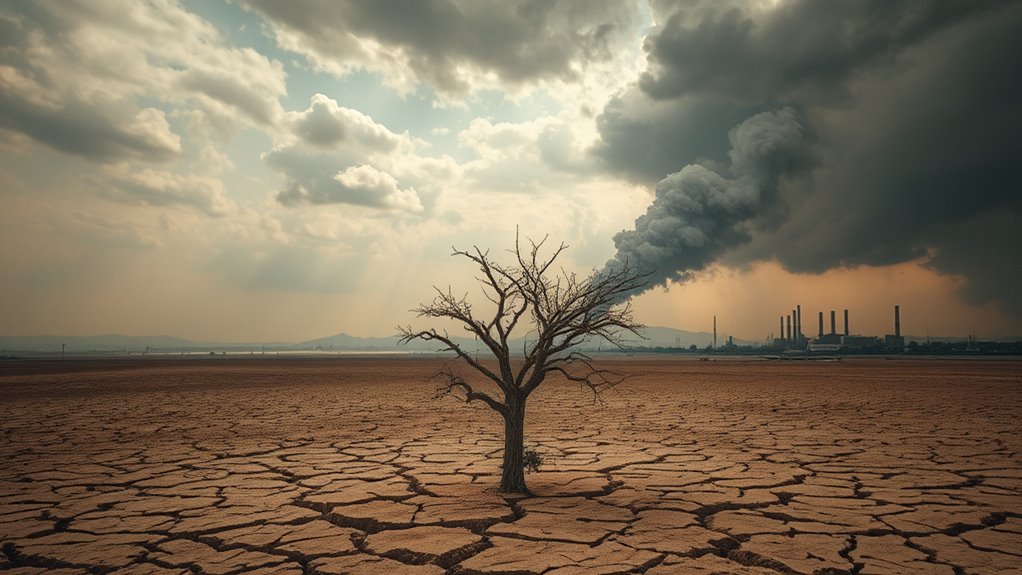Environmental ethics shape your understanding of moral duties to protect the planet amid climate change. They encourage you to make responsible choices that balance economic growth with ecological health and sustainability. By recognizing the intrinsic value of all life and ecosystems, you can take actions like reducing waste, conserving water, and supporting renewable energy. Embracing these principles helps build a more ethical and sustainable future—if you want to explore how to integrate these ideas into your life, keep going.
Key Takeaways
- Environmental ethics guide responsible decision-making to minimize ecological harm and promote sustainability amid climate change.
- Emphasize balancing economic growth with ecological integrity through long-term planning and sustainable practices.
- Ecocentric ethics recognize the intrinsic value of all living beings, fostering moral responsibility to protect ecosystems.
- Individual and collective actions, such as reducing waste and supporting renewable energy, are crucial for climate responsibility.
- Fostering awareness and policies rooted in environmental ethics ensures a sustainable future for current and future generations.

Environmental ethics shape how we comprehend our obligations to the planet, especially as climate change accelerates. These ethics guide us in evaluating our actions and their impact on the environment, pushing us toward more responsible choices. A key concept in this discussion is sustainable development, which emphasizes meeting present needs without compromising the ability of future generations to meet theirs. By adopting sustainable practices, you can help reduce environmental degradation and foster long-term well-being for both humans and ecosystems. It’s about balancing economic growth with ecological integrity, ensuring that development doesn’t come at the expense of the planet’s health. This approach encourages you to think beyond short-term gains and consider the broader consequences of your actions on the environment. Recognizing the importance of environmental surfaces and finishes can also influence how we incorporate eco-friendly materials and practices into our daily lives and projects.
In exploring environmental ethics, ecocentric ethics offers a perspective that centers the intrinsic value of all living beings and ecosystems. Unlike anthropocentric views that prioritize human interests, ecocentric ethics see humans as part of a larger web of life. This outlook urges you to recognize the interconnectedness of all species and habitats, fostering a sense of moral responsibility to protect and preserve them. When you adopt ecocentric ethics, you shift from viewing nature as a resource for exploitation to respecting it as a community of beings with rights and worth. This shift influences your behavior, prompting you to support policies and practices that minimize harm to the environment and promote ecological balance.
Understanding these principles makes it clear that climate responsibility isn’t just about reducing your carbon footprint; it’s about embracing a worldview that values sustainability and respects the natural world. You can contribute by making conscious choices—reducing waste, conserving water, supporting renewable energy, and advocating for policies rooted in ecological ethics. Recognizing the moral significance of the environment encourages you to see beyond immediate convenience and consider the legacy you leave behind. It’s about fostering a mindset that values long-term ecological health over short-term convenience.
Ultimately, embracing sustainable development and ecocentric ethics helps you realize that your actions are part of a larger story involving the planet’s future. Your choices matter, and by aligning them with these ethical principles, you can play a meaningful role in addressing climate change. The path forward involves not just individual effort but also collective responsibility—working together to build a sustainable world that respects the intrinsic worth of all life forms and ecosystems. In doing so, you affirm your commitment to a more ethical and environmentally responsible future.
Frequently Asked Questions
How Do Individual Actions Influence Global Climate Policies?
Your individual actions considerably influence global climate policies through personal accountability and policy influence. When you make eco-friendly choices, like reducing waste or conserving energy, you send a message that sustainable practices matter. This can inspire others and increase demand for greener policies. As more people act responsibly, policymakers feel pressure to implement stricter environmental regulations, ultimately shaping global efforts to combat climate change. Your actions truly matter in this collective effort.
What Ethical Dilemmas Arise From Geoengineering Solutions?
Imagine you’re steering a ship through a storm, relying on a new, untested compass. That’s what geoengineering presents—technological risks and moral hazards. You may solve climate issues temporarily but risk unforeseen consequences, like unintended weather changes or damaging ecosystems. Ethical dilemmas arise as you weigh potential benefits against possible harm, questioning whether it’s right to manipulate nature and who bears responsibility if things go wrong.
How Can Indigenous Knowledge Inform Environmental Ethics?
You can learn from Indigenous stewardship and traditional practices to deepen your understanding of environmental ethics. Indigenous communities often have a harmonious relationship with nature, emphasizing sustainability and respect. By integrating their knowledge, you gain valuable insights into caring for the environment responsibly. Their perspectives challenge modern approaches, encouraging you to prioritize long-term ecological balance and community well-being in your ethical considerations.
What Role Do Corporations Have in Climate Responsibility?
You play a vital role in climate responsibility, as corporations carry significant weight in shaping sustainability. Embracing corporate accountability means actively reducing environmental impact and prioritizing eco-friendly practices. Green marketing can showcase your commitment to a healthier planet, inspiring others to follow suit. By choosing transparency and responsible actions, you help foster a culture where sustainability isn’t just a trend but a core value, ensuring a better future for all.
How Do Cultural Differences Impact Environmental Ethical Perspectives?
You see that cultural differences shape how people view environmental ethics. Cultural values influence priorities, making some societies emphasize harmony with nature, while others focus on economic growth. Ethical diversity means you might encounter contrasting perspectives on issues like conservation or resource use. These differences impact global efforts, so understanding and respecting diverse cultural values helps you foster more effective and inclusive approaches to environmental responsibility.
Conclusion
As you consider your role in this urgent fight, remember that every choice you make has the power to shape our planet’s future. Will you step up and embrace your climate responsibility before it’s too late? The path ahead is uncertain, and the stakes have never been higher. The question remains: are you ready to act now, or will future generations wonder why you didn’t do more when it mattered most? The time is yours.









